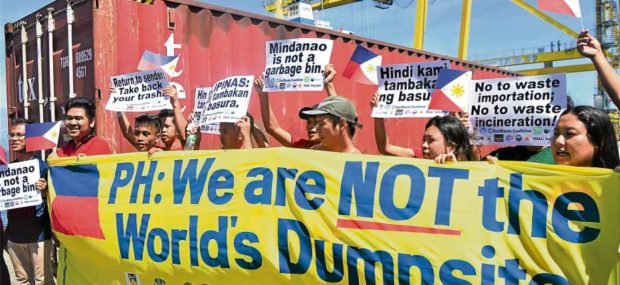Hazardous waste shipped back to HK

GOODBYE, GARBAGE Members of the environmental watchdog EcoWaste Coalition watch the departure of electronic waste for Hong Kong at Mindanao Container Terminal in Tagoloan, Misamis Oriental province, on Monday. The cargo arrived at the port four months ago. —JIGGER J. JERUSALEM
CAGAYAN DE ORO CITY, Misamis Oriental, Philippines —“This is a victory for the Filipinos.”
Thus declared an official at Mindanao Container Terminal (MCT), who presided over a ceremony to ship back hazardous waste to Hong Kong.
“The export of this hazardous waste from Hong Kong in the guise of ‘assorted electronic accessories’ is illegal under the laws of Hong Kong and the Philippines and the Basel Convention,” MCT subport collector John Simon told reporters on Monday.
“It’s simple. They want to make us their dumping ground. But they did not prevail,” Simon said.
The 2.56 tons of electronic waste from China’s special administrative region were shipped back on the SITC Nagoya, which left the port on June 3, four months after the trash arrived.
Article continues after this advertisementThe container consisted mainly of shredded gadget parts and plastic scraps, which were packed in 22 huge sling bags. It arrived at MCT in Tagoloan, Misamis Oriental province, on Feb. 2 and was put on hold by the Bureau of Customs-10 (BOC-10) for “misdeclaration.”
Article continues after this advertisementCrowd Win Industrial Limited Corp. of Pasay City, the consignee, had said the shipment contained “assorted electronic accessories” but inspectors discovered that its actual contents were smashed components of electronic devices, according to the BOC regional office.
Misdeclaration
On March 5, the BOC issued a warrant of seizure and detention against the company for violation of Section 1400 (misdeclaration) in relation to Section 117 (lack of import permit) of Republic Act No. 1086, or the Customs Modernization and Tariff Act.
Had the Chinese trash not been intercepted by BOC authorities at the port, 70 more containers filled with the same type of waste would have entered the subport, Simon said.
He described the smell of the waste as “revolting,” as these were considered “highly dangerous” to public health.
“In line with the mission of the [BOC] to strengthen efforts against smuggling and other customs fraud, we are returning this unlawful shipment to protect our nation’s health and the environment,” he said.
The environmental watchdog EcoWaste Coalition reminded the government not to allow the country to become the world’s garbage dump.
Mindanao not a garbage bin
The return of the waste to Hong Kong came on the heels of the departure of 69 containers of Canadian garbage, which had been in the Philippines in the last six years.
Mark Petalver, program coordinator of the Davao City-based environmental group Interface Development Interventions Inc., said it was “very disturbing” to find illegal waste cargoes entering the country through the region’s ports.
“This alarming trend is totally unacceptable and should discontinue as soon as possible. Mindanao is not a garbage bin,” Petalver said.
By quickly returning the waste and skipping bureaucratic delay, the country is sending a clear warning to waste traffickers to stop sending foreign waste to the Philippines, said Aileen Lucero, EcoWaste Coalition national coordinator.
“We heave a sigh of relief as the entry of some 70 containers of similar trash was aborted with the seizure of this test cargo,” Lucero said.
Basel ban amendment
The strong presence of local civil society groups in this important event, “indicates a growing concern among Mindanaoans against the use of the region’s ports as entry points for waste imports from overseas,” she added.
To protect the country from turning into a global dumping ground, the EcoWaste Coalition renewed its call for a comprehensive and immediate ban on waste imports and for the rapid ratification of the Basel Ban Amendment.
The amendment aims to prohibit the export of hazardous waste and other trash from developed to developing countries for any reason, including recycling.
Greenpeace also called for the ratification of the Basel Ban Amendment.
Greenpeace Southeast Asia-Philippines commended the government’s quick action on the waste from Hong Kong and called for better regulations to prevent the country from turning into the world’s dump.
“We see a pattern of misdeclaration, falsified documents, fake businesses and loose regulatory systems that allow this to happen,” said Lea Guerrero, the group’s country director.
Guerrero noted that the trash scandals indicated that the country was “wide open” to illegal waste importation.
Bill banning waste imports
A lawmaker whose province was the recipient of tons of trash from South Korea, Hong Kong and Australia has called for a total ban on the importation of waste.
Misamis Oriental Rep. Juliette Uy filed on Monday a bill banning the importation of “waste in their solid, liquid, organic, inorganic and other forms.” —With reports from DJ Yap and Jhesset O. Enano